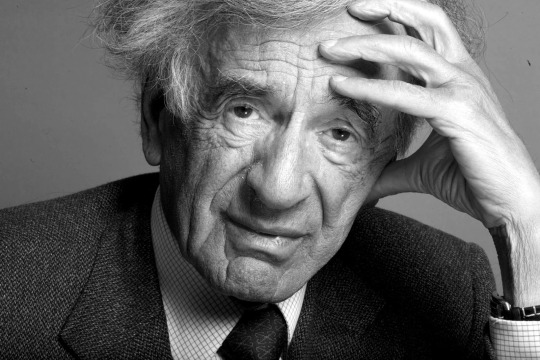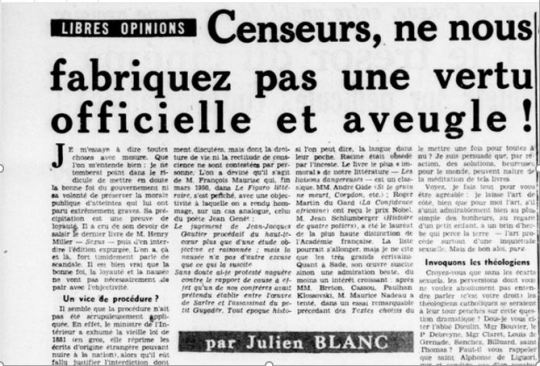#François Mauriac
Text
“We should have been, you and I, each other's executioner.”
The Loved and the Unloved by François Mauriac, translated by Gerard Hopkins
4 notes
·
View notes
Text
Campagne trempée d'aurore. Comment renoncer à tant de lumière ? Qu'est-ce que la mort ? On ne sait pas ce qu'est la mort. Thérèse n'est pas assurée du néant. Thérèse n'est pas absolument sûre qu'il n'y ait personne. Thérèse se hait de ressentir une telle terreur. Elle, qui n'hésitait pas à y précipiter autrui, se cabre devant le néant. Que sa lâcheté l'humilie ! S'il existe, cet Être, [...] qu'Il détourne la main criminelle avant que ce ne soit trop tard ; et si c'est sa volonté qu'une pauvre âme aveugle franchisse le passage, puisse-t-Il, du moins, accueillir avec amour ce monstre, sa créature.
2 notes
·
View notes
Text
Le libraire fait semblant de vendre des livres, mais il sait bien, lui, qu'il est marchand de rêves.
François Mauriac
4 notes
·
View notes
Text
YOM KIPPUR. The Day of Atonement. Should we fast? The question was hotly debated. To fast could mean a more certain, more rapid death. In this place, we were always fasting. It was Yom Kippur year-round. But there were those who said we should fast, precisely because it was dangerous to do so. We needed to show God that even here, locked in hell, we were capable of singing His praises.
I did not fast. First of all, to please my father, who had forbidden me to do so. And then, there was no longer any reason for me to fast. I no longer accepted God’s silence. As I swallowed my ration of soup, I turned that act into a symbol of rebellion, of protest against Him.
And I nibbled on my crust of bread.
Deep inside me, I felt a great void opening.
Night - Elie Wiesel
#night#און די וועלט האָט געשוויגן#Un di Velt Hot Geshvign#And The World Remained Silent#La Nuit#the night trilogy#Elie Wiesel#Marion Wiesel#François Mauriac#Barack Obama#holocaust#nonfiction#atypicalreads#history#autobiography#memoir#concentration camp#Jewish history#genocide#buchenwald#auschwitz#world war ii#world war 2#war#sad#cw negative#cw death#cw destruction#cw nazi#reading
3 notes
·
View notes
Text

Ossip Zadkine
(1888, Empire Russe - 1967, France)
François Mauriac
[1943] - Sculpture - Bronze - 63 x 56 x 36 cm
4 notes
·
View notes
Text
François Mauriac – Prefazione a «La notte» di Elie Wiesel
Elie Wiesel
… sospirai: «Quante volte ho pensato a quei bambini!», lui mi disse: «Io sono uno di loro». Era uno di loro!
François Mauriac
Dei giornalisti stranieri mi rendono sovente visita. Io li temo, diviso fra il desiderio di rivelare ogni mio pensiero e il timore di fornire delle armi a degli interlocutori i cui sentimenti nei confronti della Francia non mi sono noti. In questi incontri…

View On WordPress
0 notes
Text
"Human love is often but the encounter of two weaknesses."---François Mauriac, Nobel Prize-winning French novelist, 1885-1970
View On WordPress
0 notes
Text
Not even knowing anything about him, I saw this photo and wanted him for my husband. To snuggle up to that every night would be perfect, a man of letters who looks peaceful and civilized:

0 notes
Text
Julien Blanc, « Censeurs, ne nous fabriquez pas une vertu officielle et aveugle ! », Carrefour, 25 avril 1950, p. 8
https://julienblancromancier.wordpress.com/articles-de-j-blanc/

View On WordPress
#André Breton#André Gide#Carrefour#François Mauriac#Henry Miller#jean Cassou#Jean Genet#Jean Paulhan#Jean Schlumberger#Jean-Jacques Gautier#Klossovski#Maurice Nadeau#Montaigne Rabelais#Roger Martin du Gard#Sartre#Schlumberger#Sexus
0 notes
Text

“𝙲𝚘𝚜𝚝𝚛𝚞𝚒𝚛𝚎 𝚌𝚊𝚜𝚝𝚎𝚕𝚕𝚒 𝚒𝚗 𝚊𝚛𝚒𝚊 𝚗𝚘𝚗 𝚌𝚘𝚜𝚝𝚊 𝚗𝚞𝚕𝚕𝚊. 𝙸𝚗 𝚌𝚘𝚖𝚙𝚎𝚗𝚜𝚘 𝚎̀ 𝚖𝚘𝚕𝚝𝚘 𝚌𝚘𝚜𝚝𝚘𝚜𝚊 𝚕𝚊 𝚕𝚘𝚛𝚘 𝚍𝚎𝚖𝚘𝚕𝚒𝚣𝚒𝚘𝚗𝚎”.
(François Mauriac)
#collage#collage✂️#tutto collage#revistas#collage analogico#analog collage#collage art#art#François Mauriac#quotes#frasi#marlon brando#vivien leigh#un tranvía llamado deseo
0 notes
Photo



LE DÉSERT DE L’AMOUR by FRANÇOIS MAURIAC
愛的荒漠
0 notes
Text
137 lat temu...
137 lat temu…
Uczciwie mówiąc, nie mógłbym twierdzić, że miłuję Kościół katolicki jako taki. Gdybym nie wierzył, że otrzymał on Słowa Żywota wiecznego, bynajmniej nie czułbym podziwu ani dla jego organizacji, ani dla metod, i wiele rozdziałów jego dziejów budziłoby we mnie odrazę. […] Dla mnie Kościół, częściowo właśnie przez swoje błędy, przechował w stanie nienaruszonym depozyt, jaki otrzymał; nie to jest…

View On WordPress
0 notes
Text
Thérèse songeait que les êtres nous deviennent supportables dès que nous sommes sûrs de pouvoir les quitter.
0 notes
Text
Around midnight, we were told to run.
“Faster!” yelled our guards. “The faster you run, the faster you’ll get to go to sleep.”
After a few minutes of racing madly, we came to a new block. The man in charge was waiting. He was a young Pole, who was smiling at us. He began to talk to us and, despite our weariness, we listened attentively.
“Comrades, you are now in the concentration camp Auschwitz. Ahead of you lies a long road paved with suffering. Don’t lose hope. You have already eluded the worst danger: the selection. Therefore, muster your strength and keep your faith. We shall all see the day of liberation. Have faith in life, a thousand times faith. By driving out despair, you will move away from death. Hell does not last forever … And now, here is a prayer, or rather a piece of advice: let there be camaraderie among you. We are all brothers and share the same fate. The same smoke hovers over all our heads. Help each other. That is the only way to survive. And now, enough said, you are tired. Listen: you are in Block 17; I am responsible for keeping order here. Anyone with a complaint may come to see me. That is all. Go to sleep. Two people to a bunk. Good night.”
Those were the first human words.
-
Our one goal was to avoid the transports, to stay here as long as possible. It wasn’t difficult; it was enough never to sign up as a skilled worker. The unskilled workers were kept until the end.
At the start of the third week, our Blockälteste was removed; he was judged too humane. The new one was ferocious and his aides were veritable monsters. The good days were over. We began to wonder whether it wouldn’t be better to let ourselves be chosen for the next transport.
Night - Elie Wiesel
#night#און די וועלט האָט געשוויגן#Un di Velt Hot Geshvign#And The World Remained Silent#La Nuit#the night trilogy#Elie Wiesel#Marion Wiesel#François Mauriac#Barack Obama#holocaust#nonfiction#atypicalreads#history#autobiography#memoir#concentration camp#Jewish history#genocide#buchenwald#auschwitz#world war ii#world war 2#war#sad#cw negative#cw death#cw destruction#cw nazi#reading
3 notes
·
View notes
Text


Unire l’estrema audacia all’estremo pudore è una questione di stile.
François Mauriac
88 notes
·
View notes
Text
The Catalan authors who were kept out of the Nobel Literature Prize for being Catalan
Did you know that there have been a handful of Catalan writers who were candidates to win the Nobel Literature Prize, but because of Spanish interference they never did?
The Nobel Prize discloses its debate and reasoning process 50 years after each edition. This means that we already know the details of what happened in the earliest editions of this Prize, which was started in 1901.
The name of the Catalan play-writer Àngel Guimerà (author of Marta of the Lowlands, Mar i cel, La filla del mar...), whose works have been translated to many languages and played all around Europe and the Americas, with many film and opera adaptations, sounded often in the Nobel committee. He was presented as a candidate to win the Nobel Prize 17 times in a row, since 1907 until his death in 1924. In the editions of 1917 and 1919, many were convinced he would win. However, the declassified documents show why he didn't: as written by the man who was then president of the Nobel Committee, Haralg Härne, Guimerà wasn't given the prize "to avoid hurting the national pride of the Spanish". In 1919, Härne writes that the objective of the Nobel Prize is to promote peace and thus to award Guimerà and show support for a minority culture would be to encourage internal conflict (🤦). The Academy decided that they couldn't give a prize to Guimerà "before awarding another writer who expresses himself in the most ancient noble language of the country" (weird way to mean "the official language", aka Spanish, because they surely didn't mean Basque). In summary, if a Catalan is to be considered, he must always be second to a Spanish man. Even when the Catalan is, in the words of the Nobel Academy, "the most eminent writer of our times", he can never be considered an equal, always must be behind.
Àngel Guimerà wrote in the Catalan language, which was discriminated against by Spanish and considered an enemy by the Spanish government and much of Spanish society. Guimerà was a firm defender of the right to use the Catalan language and that nobody should be forced to speak the imperial languages instead of their own, and was involved with the political movement for the rights of Catalan people. For this reason, every time the famous Swedish academy was considering Guimerà, the Spanish Royal Academy of Language (RAE) fought it with all its might. Nowadays, Guimerà's theatre plays continue to move thousands of spectators every year.
The same happened again with the poet Josep Carner. In the 1960s, Josep Carner was on exile, because he was a Catalan poet writing in Catalan and who stood against the fascist dictatorship of Spain, which persecuted the Catalan language and identity. Famous writers from around the world, including T. S. Eliot, François Mauriac, Giuseppe Ungaretti and Roger Caillois, supported Josep Carner's candidacy to win the Nobel, but the Spanish Government did everything possible to obstruct it. We don't know if Carner would have won or not, but he was deprived of even trying because of the Spanish government's hatred of Catalan.
Something similar seems to have happened between the 1970s and 1990s to three other Catalan poets: Salvador Espriu, J. V. Foix, and Miquel Martí i Pol, where they did not get any support from the Spanish authorities, so we don't know how it would have ended up.
Another example of what it means to have a state actively working against you because of bigotry against your cultural group.
Sources: book Det litterära Nobelpriset by the president of the Nobel Committee Kjell Espmarck, Pep Antoni Roig (El Nacional), Joan Lluís-Lluís (El Punt Avui), and Jordi Marrugat (Institut Ramon Llull).
#literatura#arts#història#àngel guimerà#josep carner#literature#books#reading#nobel prize#nobel literature prize#catalanophobia#catalanofòbia#catalan#cultures#writing#human rights#minority languages#1900s#history
58 notes
·
View notes